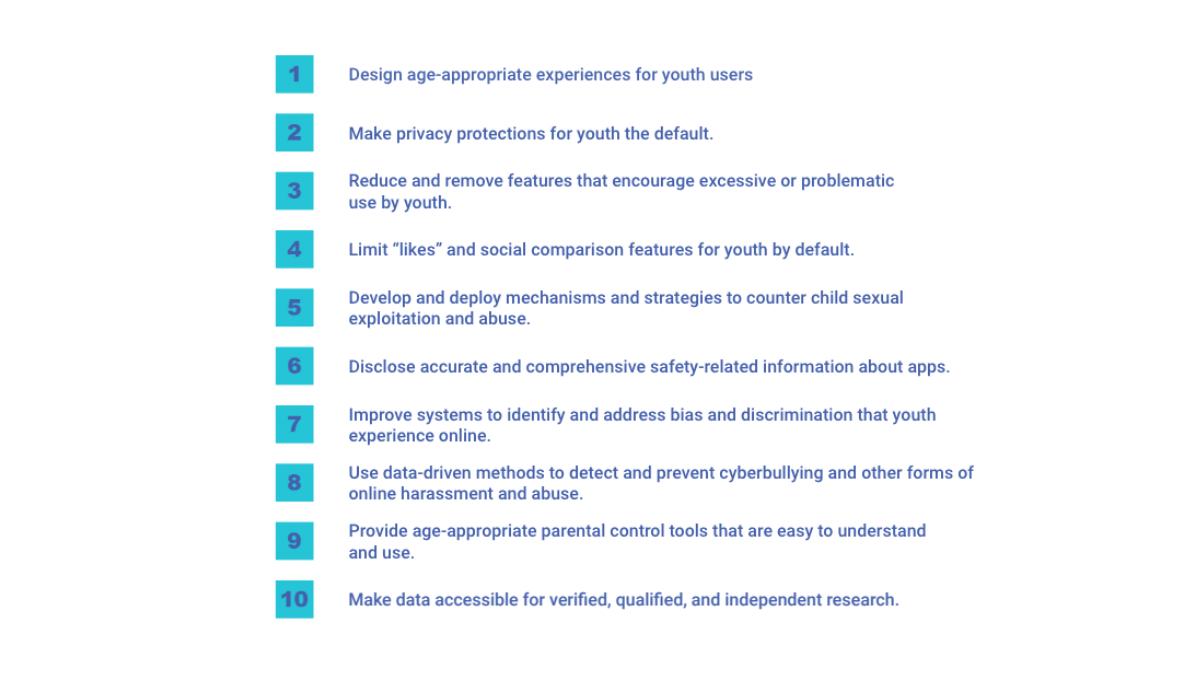Washington’s Big Week for Child Online Safety
Gabby Miller / Jul 23, 2024
Mark Zuckerberg, CEO of Meta Platforms Inc., center right, addresses the audience, including parents of children injured or lost in events involving social media, during a Senate Judiciary Committee hearing in Washington, DC, US, on Wednesday, Jan. 31, 2024. Photographer: Kent Nishimura/Bloomberg via Getty Images
While it was a dramatic weekend for President Joe Biden, who dropped out of the presidential race and endorsed Vice President Kamala Harris to be his Democratic successor, the White House kicked off the week by issuing a series of guidances, educational materials, and recommendations intended to improve child online safety. The Senate followed suit shortly after, with Majority Leader Chuck Schumer (D-NY) announcing on Tuesday that he would bring a pair of child online safety bills for a floor vote later this week, after months of being stalled.
The Kids Online Health and Safety (KOHS) Task Force, which was announced in May 2023 as part of the Biden-Harris administration’s efforts to tackle the “youth mental health crisis” and strengthen protections for children online, published a landmark report on Monday outlining best practices and guidance for doing just that. It mainly identifies key risks and benefits of social media on young users’ health, safety, and privacy; provides educational tools and best practices for families navigating social media; outlines the tech industry’s role in protecting youth online; and provides a research agenda to further study online harms and their impact on children.
At the top of the report’s list of recommendations for industry is creating “age-appropriate experiences” that take kids’ varied contexts and experiences into account. It overall recommends designing services to “prioritize the health, safety, and privacy of all users in the same way, regardless of age,” but acknowledges that designing “different experiences for the participant age groups,” requires platforms to estimate the ages of its users, either through “age assurance” or “age verification” mechanisms–tools often criticized as burdensome and privacy-infringing. The trade-off, however, is that these tools could prevent children from accessing potentially harmful online material like pornography.

A list of ten best practices that the Kids Online Health and Safety Task Force recommends online service providers adopt.
“I think the real force of this report is that we're not telling companies what they have to do, but we're saying we think you should do this,” said Alvaro Bedoya, a Commissioner at the Federal Trade Commission, at a White House press event on the Task Force’s new efforts. “We're not saying what those content recommendations should be, but we think that as a design feature, that should be turned off for young people,” he said. Some of these ‘design by default’ features include turning off infinite scroll and auto-play for young users, as well as cranking up privacy settings to prevent strangers from audibly harassing kids while playing video games, according to Bedoya.
A series of strategies for parents and caregivers to help kids navigate social media and mitigate harms also accompanied the report. For example, the Center of Excellence on Social Media and Youth Mental Health, run by the American Academy of Pediatrics and funded by the Substance Use and the Administrator of the Substance Abuse and Mental Health Services Administration, released educational materials to help families develop a “media plan” to “manage expectations and create an agreement across all members of a family or household about media use.”
“These can be so important because families can then work together to develop a shared understanding and shared planning around sort of social media time,” said Miriam Delphin-Rittmon, administrator of SAMHSA, at the press briefing. Some of the educational materials include new age-based handouts and a set of “conversation starters” that pediatricians can distribute to caregivers to help engage children in discussions around technology use.
The report’s research agenda is also a “tremendously useful” suggestion, especially from a law enforcement perspective, according to Commissioner Bedoya. Research that looks at specific design features and establishes direct harm “allows [the FTC] to establish causation in a specific case and in a specific setting,” Bedoya said.
The FTC has proven serious about going after tech companies that exploit children who use their products or services. Earlier this month, the agency banned NGL Labs from offering their anonymous messaging app to users under 18 over a slew of concerns around deceptive marketing practices and false claims about an AI content moderation program that claimed to filter out cyberbullying and harmful messages.
The KOHS report concludes with a series of steps for policymakers. These include calls for Congress to enact federal legislation protecting youth health, safety, and privacy online; voluntary commitments from platforms in implementing “age-appropriate” best practices; and giving independent researchers more access to platform data while maintaining users’ privacy, among others. The White House Office of Science and Technology Policy (OSTP) announced it will lead the effort to draft guidelines for companies implementing researcher access programs and legislators drafting privacy laws.
The Task Force’s recommendations for Congress comes amid ongoing frustration over bipartisan legislation stalled in the Senate this term. The Kids Online Safety Act, or KOSA, which would require social media companies to take a “duty of care” approach to better protect children on their platforms, was never brought to the floor, despite garnering support from nearly seventy Senate cosponsors.
But after a series of false starts, Sen. Schumer will bring both KOSA and the Children and Teens’ Online Privacy Protection Act (COPPA) 2.0 to the floor for a cloture vote later this week after working with Chair Maria Cantwell (D-WA) and the bills’ sponsors to ready them for passage, according to his office. “It has been a long and daunting road to get [these bills] passed, which can change and save lives, but today, we are one monumental step closer to success,” Sen. Schumer said in a statement. The vote comes less than two weeks before Congress leaves for recess.
Some advocates are rallying in response to senators’ eagerness to pass KOSA. On Thursday, more than 300 high schoolers will head to Capitol Hill to lobby against the bill over concerns it would cut off young users’ access to important online resources around gender identity, race, and reproductive health. The “student-led advocacy effort” marks the end of the ACLU’s National Advocacy Institute, a week-long experience offering first-hand experience to “the next generation of social justice advocates,” according to a press release.
One point of emphasis from agency officials who worked on the report is that industry can implement all ten recommendations now. “They're being done in many countries in other places, because those countries demand it from industry, and there's no reason it can't be done here,” said Alan Davidson, Administrator for the National Telecommunications and Information Administration, at the press event. “We'd like to see more from industry here stepping up.”
Authors
